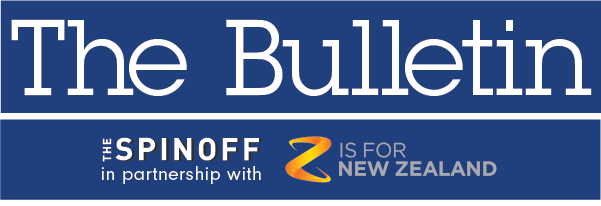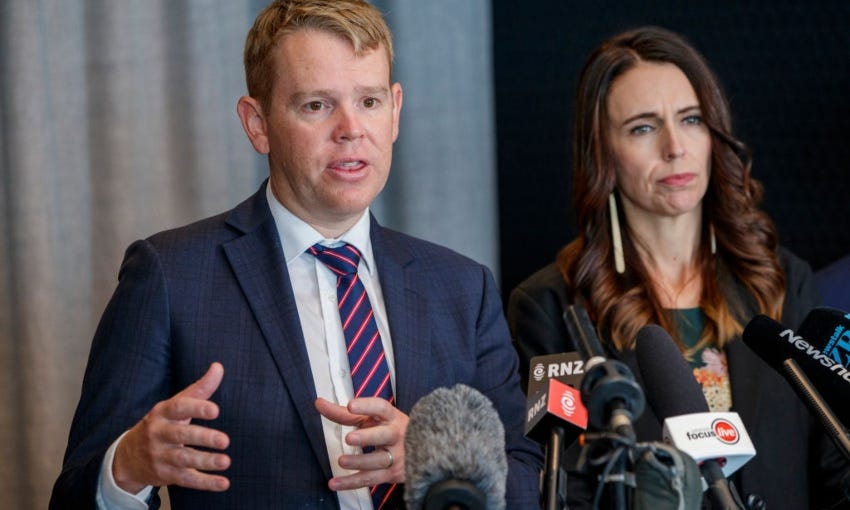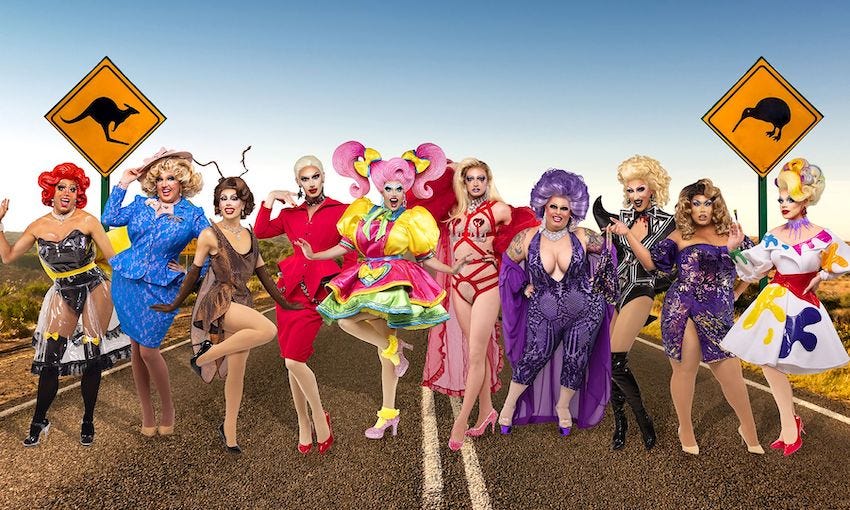Assessing the latest lockdown
Aspects of the last three weeks have been decidedly messy. Will lessons be learned?
Good morning and welcome to The Bulletin for Monday 8 March, by Alex Braae for The Spinoff. Presented in partnership with Z Energy.
In today’s edition: Assessing the latest lockdown, two arrested after threats to Christchurch mosques, and tsunami warning system holds up well. Plus – some thoughts down the page on reaching an anniversary.
Image: Covid-19 minister Chris Hipkins and PM Jacinda Ardern (Getty Images)
As with any major government decision made in a potential emergency situation, questions will inevitably be asked about the call. The fourth Covid-19 lockdown ended on schedule, with Auckland coming out of level three, and the rest of the country coming out of level two over the weekend. But it hasn't gone smoothly, so will the approach to lockdowns change as a result of these last few weeks?
You can cut the government some slack because of that aforementioned emergency, but aspects of their handling of these cases was decidedly messy. As Newsroom's Marc Daalder writes, they got a bit unlucky in the first place with this outbreak, reversing some previous runs of good luck. But the decision to leave the first lockdown in hindsight didn't work out. Elsewhere, the communications about the rules did not get through to people. The Detail got into that, questioning whether the messaging system that served the country so well last year is still up to the job. Stuff's Luke Malpass argued that "the whole Covid playbook probably needs to be rewritten a bit. The longer the pandemic goes on, the more fatigue sets in and the more difficult it gets." And on the NZ Herald (paywalled) columnist Matthew Hooton suggested the PM would be privately furious with her officials for having little choice but to put the country back into lockdown. In the news this morning, ministers have rejected calls from the opposition to hold an inquiry into the latest outbreak.
None of this is to suggest that the lockdown was the wrong decision – the counterfactual scenario of an outbreak getting a community foothold is clearly worth avoiding. For an example of that, consider New Caledonia, which has just been plunged into a snap two-week lockdown, after a school headmaster may have been infectious since a month ago. A year of a relatively relaxed approach there has also seen a high case and death rate per capita.
This particular period of the pandemic in New Zealand may not be over either, because we got news of another new case in the community last night. Our live updates covered the news of an Air NZ crew member who has tested positive, after previously going to the Auckland Airport Countdown on 3 March. Auckland was at level three at the time of the visit, so the risk is lowered, but the supermarket is still considered a location of interest, with instructions for people who were in the store on that day to monitor their symptoms. The person returned to New Zealand at the end of February, and was using the app assiduously.
Aside from this incident, the week at level three finished with every indicator suggesting there aren't any unseen chains of transmission. So attention this week will therefore turn to what comes next. The most important aspect of that will be the outline of how and when the vaccine programme will be delivered. We're expecting a plan on that this week. You might recall Justin Giovannetti's piece from last week about how the plan is still basically a secret. Over the weekend, Stuff's Andrea Vance also got stuck in, arguing that despite the positive press releases, the rollout is actually going very slowly relative to other comparable countries. One thing was teased over the weekend which seems likely – Covid-19 minister Chris Hipkins told Q+A that some form of "vaccine passport" is being considered for those who've had the jab.
One thread that came up over the week – the government has rejected calls to pay workers their full wage directly to self-isolate, reports Radio NZ. The idea was put forward by National, with leader Judith Collins saying it would "make it easier for people to do the right thing and recognising that a lot of New Zealanders are living week-to-week off their wages and they don't really have any spare cash to get them through." The thinking was that any money paid out through such a scheme would be much less than the cost of an avoided lockdown. The Greens also backed it, but Covid-19 minister Chris Hipkins was clear it is currently off the table.
Finally, on a somewhat tangential note, the surprise lockdowns have had a serious impact on sport. Of course, that's a field that has to be a lower priority in an emergency, but many codes would desperately like a bit more leeway on holding the events that keep them in business. Newstalk ZB's Elliot Smith has discussed whether it is time to start staggering crowd sizes a bit more, to allow for events to go ahead in a socially distanced manner at level two, and it's a thought-provoking argument. Like I say, it's not the highest priority, but it does seem symbolic of finding safe ways to manage outbreaks without the bluntness of a lockdown – something that will be an increasing consideration especially as the vaccine gets rolled out.
Two people have been arrested, and one charged with threatening to kill, after threats were made online against two Christchurch mosques, reports Newsroom. The person who allegedly made the threats was indirectly reported to police by the group Paparoa, which tracks extremist behaviour. At this stage, police are treating it as a criminal matter, rather than a case of terrorism. In response to the threats, the Islamic Women's Council released a statement thanking the person who alerted police. "There can be no tolerance for direct threats to people or buildings, whether these are made online or offline. We ask the public to be vigilant in reporting any such threats to authorities."
It turns out I spoke too soon last Friday when I said the tsunami threat had passed – further offshore earthquakes created the need for further evacuations. In the end, those evacuations were handled incredibly competently, and largely went off without a hitch. One town that had to pack up and move was Ōpōtiki, which the Bay of Plenty Times reports was emptied in the space of 45 minutes. Praise also came in for the calm work of new civil defence minister Kiri Allan – she was interviewed by Stuff about stepping up into bigger jobs.
Just on that tsunami warning as well, here's an interesting piece about the science of them. Earthquake expert Ursula Cochran explains how over the course of the day two different kinds of threats came in, requiring differences in the response from many different levels of emergency services, and the public. And it would appear we passed the test.
We’ve been doing our utmost to bring you all the coverage you need of the Covid-19 outbreaks and lockdowns. And we can’t do it without the generous support of our members. If you want to help out our news team with this and other big stories, please sign up here.
The meal delivery company My Food Bag listed on the stock exchange at the end of last week, to underwhelming results. As Business Desk's (paywalled) Dan Brunskill writes, the listing was overvalued, and the share price duly fell over the first day of trading. And for those following the reporting in the leadup to the listing, that shouldn't have really been too much of a surprise. Some people have won pretty big out of it all though – My Food Bag's co-founders, who have basically cashed out at the peak of the company's value.
It's harder than ever to get into med school at Otago, reports Critic Te Arohi. For the sixth year in a row, the cutoff grade from the Health Sciences First Year programme has gone up, though a place in med school isn't purely dependent on getting the best academic grades. In fact, I realised reading this story that I knew very little about how to get into med school (probably wouldn't be cut out for it) and the story gives a really interesting rundown of how difficult it is.
A hidden cost of renting you may want to check out with your landlord: Newshub's Vita Molyneux reports some tenants are wrongly being billed for fixed water charges, which under the law are supposed to be the landlord's responsibility. Tenants are still required to pay the cost of the water they use, if applicable. But this isn't an unknown problem by any stretch – the Tenancy Tribunal heard 25 cases on this in 2015 and 2016, and advocates say they're still seeing incidents of it now.
Got some feedback about The Bulletin, or anything in the news?
Drop us a line at thebulletin@thespinoff.co.nz
Right now on The Spinoff: Doctor Carolyn Providence writes about how shaming people hesitant about the vaccine won't work to change their minds, and outlines what might. Toby Manhire analyses what the latest round of google data shows about behaviour during the latest lockdown. Josie Adams has a buzzy explainer about ‘non-fungible tokens' which are selling for huge values online. Chris Schulz meets the man whose job it is to highlight when journos screw up – Mediawatch host Colin Peacock. Scott Hamilton eviscerates a dreadful and historically inaccurate column by former Labour MP Michael Bassett. Danyl Mclauchlan reviews the sequel to Jordan Peterson's breakout hit book. Richard Irvine runs down the list of the most cursed objects in New Zealand sport. And Sam Brooks goes through the field of competitors announced for the down-under season of Drag Race.
The Silver Ferns have pulled it off, winning back the Constellation Cup after almost a decade of trying. The NZ Herald's Cheree Kinnear has a match report which describes how they had to come from behind to win the decider, after taking a 2-1 lead into the final match. Young but long-serving shooter Maia Wilson summed up how much it meant to the team to reach this new height: "It's such a surreal moment," she said, "We haven't been able to bring the Constellation Cup home in a long time so we're so proud of ourselves. That grind in the second half was something to be really proud of.
And something I was definitely wrong on: Martin Guptill has shown his doubters up over the last two weeks. 218 runs at a strike rate of 160 against Australia – including two match-winning performances – has more than proved the point. The deciding match of the five game T20 series was a comfortable walk in the end, a canny bowling performance backed up by some classy hitting.
Just quickly, a personal note from me to mark an anniversary. It's amazing what you can learn in the space of three years, if you keep up with the news. You learn how quickly the world can change. You learn about why things you had previously discounted are actually really important. You learn to be more open-minded about whether an idea is good or not, rather than focusing on where it comes from. And if you're lucky, you'll learn all the time that something you believed was simple and true actually turns out to be a bit more complicated.
Today – well, Sunday really – marks three full years of doing The Bulletin. And over that time, I think what I've learned the most about news is that it doesn't always satisfactorily explain what is happening in the world. The style and format that it takes means things are often just presented as happening, divorced from context. This newsletter is a weird product, in that it couldn't exist without the primary source reporting of journalists across the country. There's only so much reporting me and my colleagues at The Spinoff can get through. But I like to think over time The Bulletin has done something a bit different: It's not so much about telling people what's going on – rather, it's more about helping people understand what's going on, and why it matters.
That's not always easy to do, because a lot of the time I don't really understand what's going on. It takes a bit of work to get a Bulletin to the point that I'm comfortable that the facts – and my interpretation of the facts – is solid enough to publish. And I'm always aware that among the readers, there will always be someone who knows a lot more about a topic than I do. That sort of feedback is always welcome and valued, but really, it's always good to get feedback no matter what it is, even if it's just a difference in opinion. It's a sign that people care about something if they take the time to send a message on it, and yes, that includes the inevitable corrections people send me.
So thank you so much for reading over the last three years, whether you started on day 1 or this is your first Bulletin. I hope you’ve learned as much from reading it as I have writing it. It remains an absolute privilege to do this job, a privilege to read the work of the journalists of New Zealand every day, and a privilege to write the first thing a lot of people read in the morning. Can't wait to do it all again tomorrow.
That's it for The Bulletin. If you want to support the work we do at The Spinoff, please check out our membership programme








Thanks Alex for your hard work over the last 3 years and getting up at stupid hours to make my life more informed hopefully a bit more balanced. Happy Anniversary.
I'd like to support you folks. I love what you are doing. But $10 a month or $100 a year is more than I want to do. Give us more options, please.